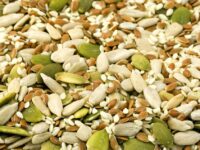A growing majority of consumers have begun to make the switch from conventionally-grown to organic produce, hoping to feel a bit better about the food they are eating and where it comes from, even if it means dropping a few extra dollars each week on groceries. Since the latter half of the 20th century, organic agriculture has been cultivated into a multi-billion dollar industry, despite a lack of substantial research backing the very health benefits it promises its consumers. This raises the question: is organic produce really any better for you?
To put it simply, numerous studies have shown that there are no significant differences between the nutritional content of conventionally and organically grown produce. On the contrary, organic farming’s approach to distancing itself from man-made substances has introduced several obstacles that stand in the way of its goals as a more natural alternative to conventional farming. Organic farming methods involve trading in the use of synthetic pesticides and fertilizers for those found in nature in efforts to lower the dietary and ecological impacts of agriculture, but many scientists argue that these naturally derived pesticides are often no safer for consumers or the environment. One example of this is copper sulphate, a naturally occurring fungicide that is rapidly built up in an organism and can be incredibly toxic even in low dose. Additionally, a study by the Brazilian Journal of Microbiology showed that animal manure, the primary substitute for synthetic fertilizers, greatly increased the risk of contamination by pathogens such as E.coli, Listeria, and Salmonella in crops. This is especially concerning because fresh produce is often eaten raw and without the use of chemical treatment, leaving consumers nearly twice as susceptible to infection when compared to the risks of consuming conventionally grown crops.
The widespread demand for organic agriculture indicates a movement towards increased awareness regarding where food is coming from and what is in it.
This is not to say that organic agriculture is all bad, however. Despite negligible difference in nutritional content, organic produce has been shown to contain higher levels of important antioxidants which, despite lacking any substantial evidence indicating major health benefits, are generally believed to play a role in combating several forms of heart disease and cancers.. In addition, the alternative pesticides used in organic farming are believed to decrease the symptoms in those with mild food allergies who may be allergic to certain types of synthetic compounds. Most of all, the widespread demand for organic agriculture indicates a movement towards increased awareness regarding where food is coming from and what is in it. Organic agriculture done right implies a heightened regard for our bodies and our planet, and should the aforementioned obstacles be overcome, true organic agriculture may very well be the farming of the future.
Sources:
International Journal of Food Sciences and Nutrition (2009). DOI: 10.1080/09637480120092071
Brazilian Journal of Microbiology (2016). DOI: 10.1016/j.bjm.2016.10.006
Alternative Medicine Review (2010). https://www.ncbi.nlm.nih.gov/pubmed/20359265
Environmental Health Perspectives (2006). DOI: 10.1289/ehp.8418
Image source: Pixabay.






